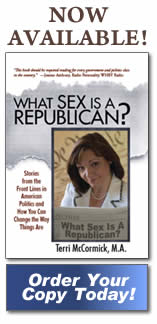Shortly after my Washington trip, I received a phone call from an individual whom I had met in one of my national committeeman’s offices. Nick had served many years in the GOP and risked much by meeting with me…or so I was told.
 When Nick requested a meeting, I suggested a well-known public restaurant near my home. I believed that whatever this man wanted, I would be more comfortable if our meeting was in the open.
When Nick requested a meeting, I suggested a well-known public restaurant near my home. I believed that whatever this man wanted, I would be more comfortable if our meeting was in the open.
After all, I had just had the rug pulled out from under me in Washington. I was both reluctant and relieved that someone in the GOP upper echelon seemed to be having second thoughts about what had transpired.
As I walked into the restaurant, the manager of the restaurant greeted me with familiar cordiality. Nick had arrived earlier and was already seated at a table. As I walked up to him, I saw the sympathetic eyes of a father figure.
“Hi, Terri, how are you?” Nick inquired.
“I have had better days,” I responded cautiously.
At this juncture, I wasn’t sure what had happened. The Washington Gannett correspondent welcomed me warmly, but an hour later, he was telling me that my own congressional delegation had lowered the boom on any political future I thought was possible. Then he added, “Terri, I’m here because I don’t agree with what was done to you by the party. I know you. I know you to be the leader we need in Washington.”
Somewhat frustrated, I asked, “What happened? Why did these people do this?”
Nick took control of the conversation, telling me that he would not give me details on what was done and why. Then he said something that I never would have believed if I hadn’t heard it with my own ears: “You have made powerful enemies.” As I sat with my mouth agape, Nick said, “I don’t agree with any of it.”
I responded in astonishment and dismay, “How can that be?”
“Powerful enemies!” he replied. The seriousness on his face was unmistakable.
“How can that be?” I repeated. “I have been serving my people. I have acted in the best interests of the voters in northeast Wisconsin. There is nothing but solid public policy and the awards to prove it.”
Nick shrugged. “Look, I like you. You are smart, you have a lot to offer … and all I can say is that I made it known that I didn’t agree with any of this, and that is all I can do.” Nick would say nothing further on that topic.
Nick did confirm that for the past six months in the Wisconsin state legislature, when my bills had been blocked, my ideas stolen, and threats were flung against me, I had gone against the political class of the party political machine that pays for elections and puts house assembly speakers in place.
What I was experiencing was a push to oust me and to remove any threat I might pose to the GOP establishment from choosing the candidate that they wanted in the Eighth Congressional seat. The establishment had ordained that it was someone else’s turn. Questions raced through my mind all at once: Wasn’t it an open seat? Didn’t we live in the United States of America? Wasn’t I a part of a political party that embraced competition? How did I make these enemies?
It dawned on me that it was the SB1 Government Accountability Board and Ethics Bill that sealed my fate. A letter, written on GOP stationery, made it perfectly clear that I needed to back away from the issue of ethics in government. This letter warned me not to “meddle with the finance system of our elections.” Ironically, I had never taken up that issue. The memory of this letter was ironic—I did not support the Washington-based Campaign Finance Reform Act, known as the McCain-Feingold Act, Public Law 107-155, November 6, 2002. It was a bipartisan boondoggle that did little to reform anything it claimed, such as soft money financing, issue ads and curtailing contributions from government contractors. There were loopholes written for contributors that were large enough for a truck to drive through. Worse, the McCain-Feingold Act created the nefarious “527’s,” a new political entity that the American people can thank for those “hate-filled attack ads” on television, produced under the dark veil of anonymity.
I had made “powerful enemies”? He had to be kidding. The antics, five years earlier, when the sitting Republican governor was taken down in his reelection bid, were repeating themselves over again. The same players were involved. This time, however, they were caught. The intricate plan was blown. The GOP party elites sitting on the Wisconsin Congressional Committee, who had made the decision to steal the election from the voters, were, in fact, “outed”! Gannett’s Washington news correspondent Brian Tumulty had been right—in the USA TODAY offices. The press was the only guardian of freedom and democracy—when it did its job as “truth seekers.”
The indictments and convictions of the GOP and Democratic Party leaders have done little to curb the dysfunctional elite leaders in the political class and their need for power and control. Worse, many of these politicians have been rewarded with jobs and placements as lobbyists or consultants that guarantee higher-paying salaries. The only remorse these players seem to have is they were caught.
Virtue, principle, ethics and integrity must be restored internally in order to return our state houses and our nation’s Capitol back to the people in the cities, farmlands and hills across this country. Once we discover that choices in our own behaviors and in our principles are in our hands, we can get back to the business of serving others and strengthening the democracy envisioned by our forefathers. Maybe that seems like our conclusion. Maybe it seems as though restoring order internally will serve as our final act to put things right again. But in reality, this is merely our beginning.
CHAPTER SUMMARY
- In-party politics can have just as much impact as intra-party politics.
- Going against one’s party leaders and the political class may have devastating effects on a political career.
“Nearly all men can stand adversity, but if you want to test a man’s character, give him power”
—Abraham Lincoln
….To continue reading this book, get your copy of “What Sex is a Republican in paperback or Kindle edition on Amazon.
About the Author:
Terri McCormick is an author, policy expert, educator, and former state representative to the Wisconsin State Legislature. Today, she offers her expertise in public and government relations through McCormick Dawson CPG Ltd., a trusted consultancy of independent contractors.
Ms. McCormick serves as president and CEO of the company, drawing from more than two decades of professional experience, a strong educational foundation, a host of industry-related publications, and a multitude of accolades, awards and formal recognitions. Holding a Master of Arts in administrative leadership from Marian University, and a Bachelor of Science in political science and public administration from the University of Wisconsin, Ms. McCormick received both degrees with high honors.
“What Sex is a Republican?” is sold on Amazon in both the paperback edition as well as Kindle edition. Read reviews on Amazon here.



